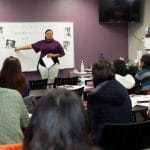Verb Tenses in English: A Perfect Present or A Simple Past
The present perfect can be very difficult. To be honest, verb tenses in English are a bit confusing. The present is perfect… is that referring to some kind of spiritual thing like live in the moment? Carpe diem. Seize the moment.
Seize, by the way, was one of our recent vocabulary words for an enrichment reading we did in Advanced 1 that was accompanied by a movie recommendation to watch “The Dead Poet’s Society” and hand in a summary or written response. I love that movie.
Actually, it was watching that movie that I learned what “carpe diem” meant. Seize the day. And you should. Everyone should. Live in the moment. Make your present perfect. (And watch “The Dead Poet’s Society” – because watching movies is a great way to learn English even for native speakers like me.)
English Verb Tense: Present Perfect
Back to the present perfect, the grammar term. This is when we use have/has + past participle verb.
Have/Has + Past Participle Verb = Present Perfect Tense
Back to the present perfect, the grammar term. This is when we use: have/has + past participle verb.
The present perfect tense is used when we are speaking about things that occurred in the past, but are relevant to the time of speaking. That is a mouthful, which may or may not make sense. So, I like to explain it comparing it with the past simple.
Now, I am not saying that your past is simple. Nobody’s past is simple. We all have stories to tell. But, in grammar terms, the past simple refers to actions that started and stopped in the past. (By the way, ask a native English speaker about any of these grammar terms and I bet 9 times out of 10, they won’t have a clue what you are talking about.)
Okay, so you may be thinking… if the present perfect happened in the past and the past simple happened in the past, how the heck are they different?
Key words, or context clues, can help you decide whether it should be in past simple or present perfect or not.
For example, “yesterday” indicates the past simple. “I watched the Dallas Cowboys game yesterday.”
However, if I want to express how many times something has happened in the past up to today, I will need to use the present perfect.
For example, “I have watched the Dallas Cowboys football games so many times I can’t even count them all.” The idea of many times indicates the present perfect. The action started and stopped multiple times at some unknown time in the past.
But, be careful because “many times” does not necessarily mean that it should be in the present perfect tense.
Let’s say that I used to watch football, but now I hate it. So I could say, “I watched football many times when I was younger.” In this sentence, there is no idea that the action is relevant today. I am speaking of the action as a past event in relation to a specific time in the past. When did it happen? It happened “when I was younger”.
This is an important distinction between the past simple and present perfect.
English Verb Tense: Past Simple
With the past simple, we say when the action occurred in the past: it could be with a time clause like “when I was younger” or with key words like:
- hours, days or years ago
- yesterday
- last night, week, month, year, birthday, etc.
With the present perfect, the time is not known. It is some general time in the past before now. Some common key words are:
- already
- yet
- ever
- so far
- since + time, day, year or date
- for + # of hours, days, weeks, months, or years
Present perfect is also commonly used for questions when you want to get to know about someone’s past experiences.
For example, “Have you ever been to Paris?”
I am not going to ask “Did you go to Paris?” because in order for this sentence to sound natural I need to attach it to a specific time in the past.
I can do this by using a time word, “Did you go to Paris last year?” or by referring to a time in the past within the context of the conversation like, “When you were in France, did you go to Paris?”
But, let’s go back to the question, “Have you ever been to Paris?”
I am asking you this question because I want to know if at some unspecified time in your life were you in Paris. It could be that you went to Paris when you were 3 years old, or 20 years old, or maybe you go every summer. I DON’T KNOW, but I would like to know.
So, your answers can vary.
- “No, I have never been to Paris.”
- “Yes, I have gone to Paris two times.”
- “As a matter of fact, I went to Paris last year.”
(There is no rule saying that you have to answer a question in the present perfect with the present perfect! You can use past simple if you would like to offer more information about when that specific event occurred in the past.)
Okay, we have compared the present perfect with the past simple saying that the present perfect refers to actions that occurred at an unspecified time in the past whereas the past simple refers to actions that occurred at a specified time in the past.
How to Use Present Perfect Tense Another Way
Now, let’s look at another use for the present perfect. Let’s say I moved to Dallas on August 18th, 2019 and today is September 18th, 2019. I am going to use the present perfect to express how long.
For example, “I have lived in Dallas for one month.” Or, “I have lived in Dallas since August 18th. “
I am telling you when this action started and connecting it to the present time.
Often students ask how this is different from “I am living in Dallas.” Or “I live in Dallas.” Well, this only tells me that the action is happening right now. It does not express for how long.
If you want to say for how long, then you need to use the perfect tense.
Fun Questions to Ask to Get to Know Someone
I will leave you with some fun questions that students like to ask when they interview each other to find out about their past experiences.
- Have you ever gone scuba diving?
- What is the weirdest thing you have ever eaten?
- Have you slept underneath the stars?
- What is the coldest (or hottest) you have ever been?
- Have you ever been to Dallas?
- How many cups of tea or coffee have you already had today?
- Have you ever cried during a movie? What movie was it?
Oh, and hey, speaking of movies, check out “Dead Poet’s Society”. It is an American classic, and an excellent way to help you learn English!














